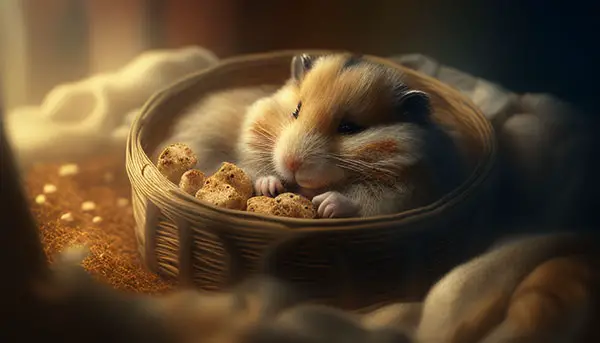Why is My Hamster Sleeping so Much
If you’re a hamster owner, you might have noticed that your little furry friend seems to sleep a lot. While hamsters are known to be active creatures, it’s not uncommon for them to spend a significant amount of time sleeping.
So, why is your hamster sleeping so much? The most straightforward answer is that hamsters need a lot of sleep to maintain their health and well-being. However, if you’ve noticed a sudden increase in your hamster’s sleeping habits, it could be due to various reasons such as illness, aging, environmental factors, or diet.
In this blog post, we will delve into the possible causes of excessive sleeping in hamsters and provide guidance on how to prevent and address these issues.
Possible Reasons for Excessive Sleeping
While it’s normal for hamsters to sleep for long periods, there are certain circumstances where excessive sleeping could indicate an underlying issue, including

Illnesses or Injuries
Just like any other animal, hamsters can become ill or get injured. When this happens, their bodies will try to heal themselves, which can result in excessive sleeping. Some common illnesses that can affect hamsters include respiratory infections, mites, and tumors.
Look out for symptoms, including lethargy, appetite loss, and difficulty breathing. If you suspect your hamster is ill or injured, take them to a veterinarian for a proper diagnosis and treatment.
Aging
As hamsters age, their sleep patterns can change. Older hamsters tend to sleep more and become less active, which is normal. If you have an aging hamster, ensure a comfortable and safe environment.
You can ensure a soft and cozy bed, easy access to food and water, and a temperature that’s not too hot or too cold for them. Similarly, you can also give them some gentle exercises, like slow walks or wheel runs, to keep them active and healthy.
Environmental Factors
The environment in which your hamster lives can also affect its sleep patterns. Hamsters are crepuscular animals, which means they are most active during dusk and dawn. During the day and night, they tend to sleep for more extended periods.

Ensure your hamster’s environment is quiet, with little to no noise or activity levels. Also, to help regulate their sleep patterns, provide a consistent light and dark cycle. Keep the temperature and humidity levels comfortable and ensure adequate ventilation.
Diet
A hamster’s diet can also affect its sleep patterns. Nutritional deficiencies can lead to lethargy and excessive sleeping. Ensure your hamster gets a balanced diet that includes fresh vegetables, fruits, and high-quality commercial food.
Overfeeding or underfeeding can also affect their sleep patterns. So ensure that you feed them the appropriate amount for their size and age.
Normal Hamster Sleep Patterns
Understanding hamsters’ natural sleep patterns is important to ensure they get the right rest and activity. Here are some details on the normal sleep patterns of hamsters:

How Much Do Hamsters Typically Sleep?
Hamsters are crepuscular, which means they are most active during dawn and dusk.
- They typically sleep during the day and are awake at night
- Adult hamsters require an average of 12-14 hours of sleep per day
However, this can vary depending on their age, species, and environment.
- Some hamsters may sleep for more extended periods, while others may sleep less
Differences in Sleep Patterns Between Different Species of Hamsters
Different species of hamsters have varying sleep patterns. For example,

- Syrian hamsters are known to be less active during the day and sleep more during the night
- Roborovski dwarf hamsters, on the other hand, are known for their high activity levels and may require less sleep than other species
Signs of Abnormal Sleep Patterns
While hamsters are known for their love of sleeping, it’s important to watch out for any signs of abnormal sleep patterns. For example,
- If your hamster is sleeping more than usual or is consistently sleeping during the night, it could be a sign of an underlying health issue
- Conversely, if your hamster is sleeping less than usual or is displaying signs of restlessness, it could be a sign of stress or anxiety
Preventing Excessive Sleeping in Hamsters
As a hamster owner, you want to ensure your furry friend gets the right amount of sleep, neither too much nor too little. Here are some tips for preventing excessive sleeping in hamsters:

Tips for Maintaining a Healthy and Stimulating Environment
Hamsters need a healthy and stimulating environment to stay active and alert.
- Provide a spacious and well-ventilated cage that allows for ample exercise and exploration
- Include plenty of toys and activities, such as a hamster wheel, chew toys, and hiding places
- Also, change and clean the cage regularly to maintain a clean and hygienic environment
Hamster Care and Feeding Guidelines
Proper care and feeding are essential for preventing excessive sleeping in hamsters.

- Make sure to provide a balanced and nutritious diet consisting of a combination of commercial hamster food, fresh fruits and vegetables, and occasional treats
- Also, provide fresh water at all times and regularly clean and refill the water bottle
- It’s important to follow feeding guidelines and avoid overfeeding or underfeeding, which can lead to weight gain or malnourishment
Ensuring Proper Exercise and Socialization
- Hamsters need regular exercise and socialization to maintain a healthy sleep-wake cycle
- Provide opportunities for exercise, such as a hamster wheel or playpen
- Additionally, ensure your hamster has plenty of socialization time with you and other hamsters if you have more than one. Socializing with your hamster can also help prevent boredom and provide mental stimulation.
FAQs
Here are some of the frequently asked questions for more information.
Q: Is it normal for hamsters to sleep a lot?
Yes, it is normal for hamsters to sleep a lot. Hamsters are nocturnal animals, so they are naturally more active at night and tend to sleep during the day. They may sleep up to 14 hours per day, depending on their age, health, and environment.
Q: Can stress cause hamsters to sleep more than usual?
Yes, stress can cause hamsters to sleep more than usual. If your hamster is experiencing anxiety, such as a change in their environment or the presence of predators or other pets, they may feel the need to sleep more to conserve energy and reduce their risk of danger.
Q: How can I tell if my hamster is sleeping too much?
If your hamster is sleeping more than usual and you’re concerned about its health, there are a few signs to look out for. These include weight loss, decreased appetite, lethargy, changes in behavior or temperament, and unusual discharge or droppings.
Bottom Line
There can be various reasons why your hamster is sleeping so much. It could be due to age, illness, or environmental factors such as lack of stimulation or too much light.
It is essential to monitor your hamster’s sleeping habits and overall behavior to determine if there are any underlying health issues. Ensuring that your hamster has a comfortable and stimulating environment, proper nutrition, and regular exercise can also help improve their sleep patterns.




